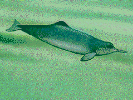
Baijis hunt in small groups of four or fewer, taking a wide variety of fish. the best hunting spots are near sandbanks and around the ends of islets or in areas where tributaries spill into the main river. Their white backs are barely visible as they glide to the surface. Occasionally, a long white beak will appear, but since they have poor vision, the animals have little reason to poke their heads out of the water to spyhop. AFter feeding, which takes place mainly in the early morning and at nightfall, baijis sometimes rest for up to six hours in the still center of river eddies near the sandbanks.
In August, 2007, a report was issued declaring the Baiji to likely be extinct. A six week survey of their habit from November to December, 2006, failed to spot any of the animal. There was no discussion of the protected zones promised many years ago, it's unknown if they were set up.
It is considered conceivable that some surviving members may have been missed - the extinction is not yet confirmed. The primary causes are believed to be dams, overfishing, and collisions with boats. Local fisheries used techniques such as rolling hooks, nets, and electrofishing, all of which may have contributed directly and indirectly.
Lipotes vexillifer
Size: 2 to 2.5 m, 135 to 230 kg. Females slightly larger than males
Calves at birth: 70 to 80 cm
Teeth: 30 to 35 conical teeth on each side of upper and lower jaws
Food: Fish such as catfish and large-scaled fish
Habitat: Rivers
Range: Lower and middle Yangtze River system and adjacent lakes
in China
Status: Potentially extinct as of 2007
